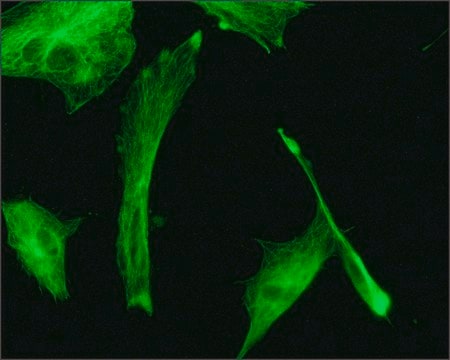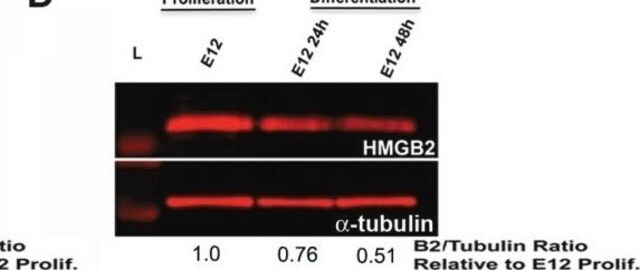C4585
Anti-β-Tubulin−Cy3 antibody, Mouse monoclonal
clone TUB 2.1, purified from hybridoma cell culture
Synonym(s):
Monoclonal Anti-β-Tubulin
About This Item
Recommended Products
biological source
mouse
Quality Level
conjugate
CY3 conjugate
antibody form
purified from hybridoma cell culture
antibody product type
primary antibodies
clone
TUB 2.1, monoclonal
form
buffered aqueous solution
mol wt
antigen 55 kDa
species reactivity
human, rat, frog, moth, mouse, plant, rabbit, chicken, bovine, wheat, sea urchin, hamster
storage condition
protect from light
technique(s)
direct immunofluorescence: 1:100 using cultured chicken fibroblasts or BHK cells
isotype
IgG1
shipped in
wet ice
storage temp.
2-8°C
target post-translational modification
unmodified
Gene Information
human ... TUBB(203068) , TUBB1(81027) , TUBB1(81027) , TUBB1(81027) , TUBB1(81027) , TUBB2A(7280) , TUBB2A(7280) , TUBB2A(7280) , TUBB2A(7280) , TUBB2C(10383) , TUBB2C(10383) , TUBB2C(10383) , TUBB2C(10383)
mouse ... Tubb1(104068) , Tubb1(104068) , Tubb1(104068) , Tubb1(104068) , Tubb2a(22151) , Tubb2a(22151) , Tubb2a(22151) , Tubb2a(22151) , Tubb2c(227613) , Tubb2c(227613) , Tubb2c(227613) , Tubb2c(227613) , Tubb3(22152)
rat ... Tubb2(29212) , Tubb2(29212) , Tubb2(29212) , Tubb2(29212) , Tubb2c(296554) , Tubb2c(296554) , Tubb2c(296554) , Tubb2c(296554)
Looking for similar products? Visit Product Comparison Guide
General description
Specificity
Immunogen
Application
- immunohistochemical assays
- immunofluorescence
- western blotting
- immunocytochemistry
- immunoblotting
- immunostaining
Biochem/physiol Actions
Physical form
Legal Information
Disclaimer
Not finding the right product?
Try our Product Selector Tool.
Storage Class Code
10 - Combustible liquids
WGK
nwg
Flash Point(F)
Not applicable
Flash Point(C)
Not applicable
Personal Protective Equipment
Certificates of Analysis (COA)
Search for Certificates of Analysis (COA) by entering the products Lot/Batch Number. Lot and Batch Numbers can be found on a product’s label following the words ‘Lot’ or ‘Batch’.
Already Own This Product?
Find documentation for the products that you have recently purchased in the Document Library.
Articles
Microtubules of the eukaryotic cytoskeleton are composed of a heterodimer of α- and β-tubulin. In addition to α-and β-tubulin, several other tubulins have been identified, bringing the number of distinct tubulin classes to seven.
Our team of scientists has experience in all areas of research including Life Science, Material Science, Chemical Synthesis, Chromatography, Analytical and many others.
Contact Technical Service








